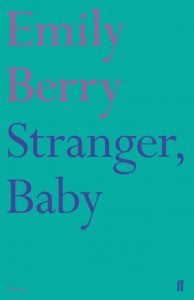Stranger, Baby (Shortlisted, 2017 Forward Poetry Prize for Best Collection)
“The loss of a mother must be something very strange…”. This epigraph from Sigmund Freud sets the scene for Emily Berry’s superb second collection, Stranger, Baby, which concerns the sense of dislocation, “dismantlement” and alterity brought about by intense grief.
The suicide of her mother left the narrator/Berry all at sea from the age of thirteen – water is a recurring metaphor throughout the collection. In “Picnic”, for example:
Watching the sea is like watching something in pieces continually striving to be whole Imagine trying to pick up a piece of the sea and show it to a person[.]
References to and descriptions of waves, water, rain and sea allow the reader an appreciation of the immensity and intensity of the experience of loss on a scale which no amount of psychotherapy can fully apprehend – just imagine “trying to pick up a piece of the sea and show it to a person”.
There are arresting phrases like this – phrases which have got under my skin – throughout the collection. I think there’s something about the matter-of-fact, slightly ironic register in amongst the metaphors and imagery which augments the unnerving effect. In “Sleeping”, for example:
If it was up to me, I would not have her back. It is not up to me, and she is not coming back.
And in “Ghost Dance”:
They touched me in various places and asked me if it hurt. I said no. They did not ask if it hurt when they did not touch me.
Often, it’s as though we receive Berry’s unprocessed thoughts, streamed to us during her process of writing. This ought to create a sense of intimacy, yet the very controlled register keeps us at a distance and maintains the narrator’s isolation and dissociation. From “Picnic” again:
I like it when I am writing a poem and I know that I am feeling something To be poised and to invite contact Or to appear to invite contact[.]
Indeed, this collection in part concerns the relationship, interaction and gap between feelings and words. Poetry allows the narrator to distort her “own” voice – it’s her story, her lens, but poetry allows – necessitates – distortion. “The End” is a beautiful, strange poem which explores the cul-de-sacs of loss:
I believed death was a flat plain spectacular endlessly Can you distort my voice when I say this?
By the same token, once feelings are “transcribed” into “art” or even simply into “words”, they become something else; something distorted. In “Girl on a Liner”:
[….] there was a feeling but I wrote it down and it ceased to be a feeling, became art. ‘“I am afraid of…”’ they explained, ‘might be better rendered as, “There is a fear of…”’ […]
There’s something of the power of Denise Riley’s Say Something Back in this collection and its transcription of felt grief. Berry has re-inhabited her experience of loss to re-present it poetically in ways which are at once highly immersive yet also distanced. This is difficult territory with many potential pitfalls but there is no hint of solipsism in Berry’s writing – on the contrary, it’s shot through with an exuberance and playfulness.
Although it’s a strongly-themed collection, there’s a great deal of surprise and variety to be found in the different forms which individual poems take – from the short dialogues between different “parts” of the narrator’s fragmented persona in “Tragedy for One Voice” to narrow, short-lined poems which convey both controlled restraint and an impulse to shrink or withdraw in the face of shame which surrounds proximity to grief and death.
There’s so much more to say about Stranger, Baby and what makes it, at the same time, thought-provoking, funny and painful. Better just to read it for yourself.


A fantastic review.. makes me want to get hold of this collection.